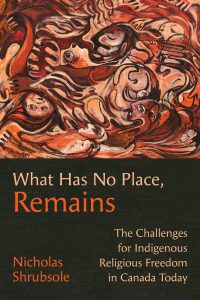
Nicholas Shrubsole has published his first book, What Has No Place, Remains: The Challenges for Indigenous Religious Freedom in Canada Today (University of Toronto Press). This book explores the barriers Indigenous People of Canada experienced regarding religious freedom in the past and those still present today. The Philosophy Department will be holding a book discussion with Dr. Shrubsole, and as a primer Shrubsole shared with us how his book came to be and what he hopes readers will take away after reading.
How did the book come to be?
The book is a product of work that began at the outset of my doctoral career in 2007. At the time, I was deeply invested in postcolonial theory. As a person living in Canada, I began to think about how one might think about postcolonialism in the Canadian context. Upon further reading, I realized that a lot of what was being discussed in postcolonialism in other places around the world found resonance in Canada. Of course, colonial ideology does not manifest in any universal way; it is always specific to a place and the history of that place. It is at that point that I came to the broader subject of Indigenous Peoples’ continuing challenges with colonialism in Canada.
An article by Religious Studies scholar Lori Beaman from 2002 on Aboriginal Spirituality and religious freedom in both Canada and the United States that provided greater focus to my broader interest. Beaman’s article focused on a 1985 case called Jack and Charlie v. The Queen. Her analysis was excellent but what was pretty evident from that article was that there was far more material on the subject in the United States than there was in Canada. It is not that the subject is less important in Canada, but just that the U.S. courts and legislature had been giving the matter attention since the Lyng case and the introduction of the American Indian Religious Freedom Act in the 1970s. Conversations in the United States were maintained with the Religious Freedom Restoration Act in response to the 1993 case involving the Native American Church.
But what about Canada? Surely something had taken place since 1985? For some reason the subject had not garnered the same enthusiasm in Canada as it had in the United States. Certainly within Religious Studies, there was almost nothing on the subject. Michael Ross’ book First Nations Sacred Sites in Canada’s Courts was the most helpful work in this regard. Ross is a lawyer and his work really focused on legal strategy, but it helped to identify the many ways in which Indigenous religious freedom was being brought to the attention of the courts. More recently, it has been John Borrows who has offered commentary on the subject, but even until the publication of this book, attention has been limited.
While it took until 2017 for Canada’s Supreme Court to issue a ruling on Indigenous religious freedom, Indigenous Peoples had been encountering barriers for religious freedom for … well, the barriers have never stopped—they’ve just changed. So, what are those barriers? How have they changed? The barriers are many; they are complex; they are interrelated. This book is the first comprehensive exploration of those barriers.
What do you hope readers get from the book?
As noted in the preface to the book, I do hope that the book sparks a more in-depth conversation on the matter. It is a macro-level analysis and more honed and community-specific studies are needed. This book is a first step. For those unfamiliar with the subject and region in its entirety, I hope that it does provide an introduction to the subject matter. I will admit, it is an academic work with an intended audience that are actively engaged in thinking about these things. Nevertheless, I hope it does provide some insight for academics and non-academics alike in seeking to understand the very complex ways in which colonialism continues to manifest in the boundaries of Canada. Who knows, scholars working in other jurisdictions may also find correlations and similarities that are fruitful for analysis and the ultimate goal of decolonization.
You can view more information about the upcoming book discussion on our events page. The first 15 students will receive a free copy!